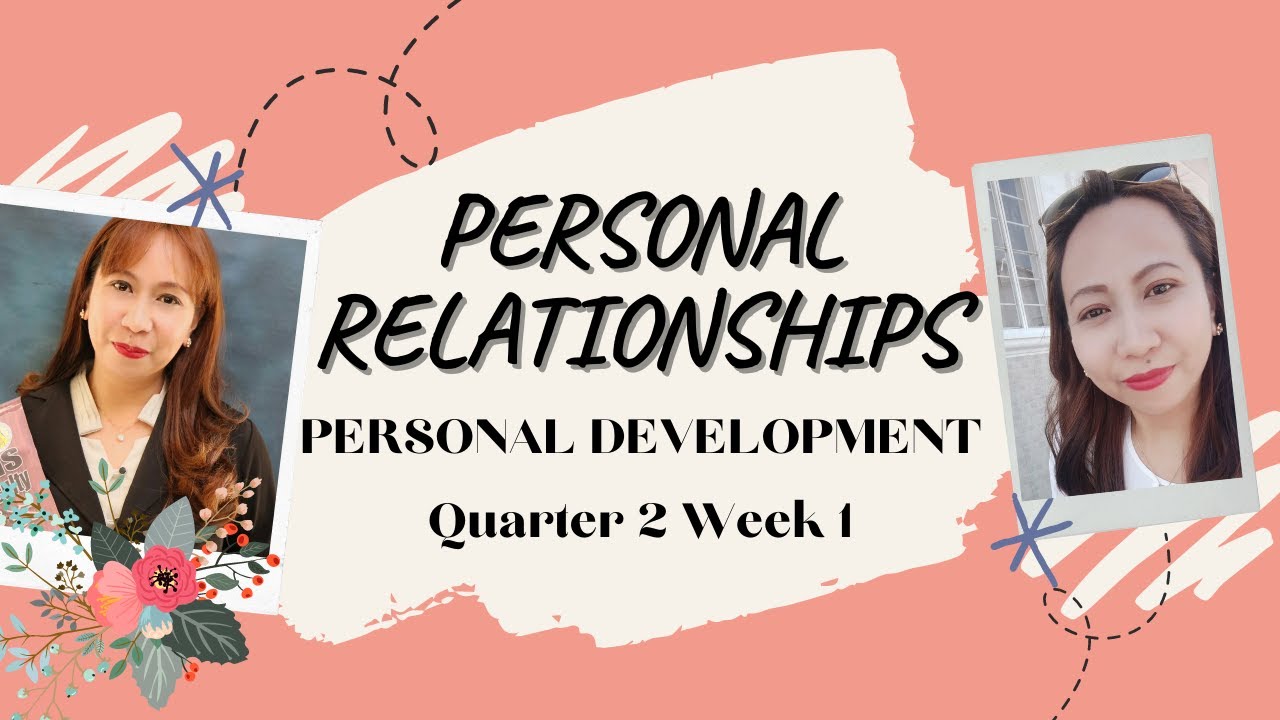ETULAY PERDEV Q2 WEEK1: Teen-age Relationships Including the Acceptable and Unacceptable....
Summary
TLDRIn this personal development tutorial, Tutor A discusses key aspects of teenage relationships, focusing on attraction, love, and commitment. The lesson covers acceptable and unacceptable relationship behaviors, such as respect, trust, and support, as well as the negative impacts of cheating, control, and poor communication. Key concepts like attraction, love, and the importance of mutual understanding are explored, alongside practical advice on maintaining healthy relationships. The video emphasizes the importance of communication, responsibility, and commitment, leaving viewers with a powerful reminder about the significance of loving actions and personal growth.
Takeaways
- 📘 The lesson focuses on personal development, specifically on teenage relationships, attraction, love, and commitment.
- 👫 Personal relationships are emotional bonds formed with others, categorized as family, friends, and romantic partnerships.
- 💬 Healthy relationships are built on mutual respect, trust, and consistent support between partners.
- 🚫 Unacceptable behaviors in relationships include cheating, controlling behavior, and lack of communication.
- 💖 Attraction is defined as a feeling of interest or desire toward someone, influenced by factors like physical attractiveness, similarity, proximity, and reciprocity.
- 🔥 The triangular theory of love by Robert Sternberg explains love as a combination of intimacy, passion, and commitment.
- 🤝 Commitment involves maintaining a long-term relationship with mutual dependence, cooperation, and shared responsibilities.
- 📚 The session includes assessments where learners answer true-or-false and multiple-choice questions to reinforce their understanding of the topics.
- 🙏 The tutor emphasizes valuing responsible behavior in relationships and encourages learners to express love with sincerity and truth.
- 🌟 The closing message inspires students to recognize their potential, live with love and integrity, and believe in their ability to achieve greatness.
Q & A
What is the main focus of the personal development lesson discussed in the script?
-The lesson focuses on teenage relationships, including acceptable and unacceptable expressions of attraction, as well as understanding attraction, love, and commitment.
What are the three key topics covered in Quarter 2 of the personal development course?
-Quarter 2 covers building and maintaining relationships, establishing social influences, and understanding various concepts about career development.
What are the learning objectives of this particular session?
-By the end of the session, learners should understand teenage relationships and expressions of attraction, express ways of showing attraction, love, and commitment, and value responsibility in a relationship.
What are the three main forms of personal relationships mentioned in the script?
-The three main forms of personal relationships are family, friends, and romantic partnerships.
How is 'privacy and intimacy' defined in the context of personal relationships?
-Privacy and intimacy involve openness and sharing between individuals, creating emotional or physical bonds that strengthen the relationship through trust and comfort.
What makes an expression of attraction acceptable in a healthy relationship?
-Acceptable expressions are based on mutual respect, trust, and support between partners, ensuring understanding and emotional balance.
What are some examples of unacceptable expressions in a relationship?
-Unacceptable expressions include cheating, controlling behavior, and lack of communication, as these damage trust and emotional health.
What are the key components of attraction mentioned in the lesson?
-The key components are physical attractiveness, similarity, proximity, and reciprocity, all of which influence how people connect with and feel drawn to others.
According to Robert Sternberg’s Triangular Theory of Love, what are the main components that define love?
-The theory identifies intimacy, passion, and commitment as the three main components of love, which together form consummate love.
How is commitment described in the lesson?
-Commitment is described as a long-term relationship where individuals depend on each other for support, coordination, and shared responsibilities, reflecting a deeper sense of connection.
What moral lesson does the tutor leave the students with at the end of the episode?
-The tutor quotes a Bible verse from 1 John 3, reminding learners to love not just with words or speech but through actions and truth, encouraging genuine care for others.
What attitude does the tutor encourage learners to maintain about themselves?
-The tutor encourages learners to never doubt their potential, believe they are courageous conquerors, true champions, and destined for greatness.
Outlines

Dieser Bereich ist nur für Premium-Benutzer verfügbar. Bitte führen Sie ein Upgrade durch, um auf diesen Abschnitt zuzugreifen.
Upgrade durchführenMindmap

Dieser Bereich ist nur für Premium-Benutzer verfügbar. Bitte führen Sie ein Upgrade durch, um auf diesen Abschnitt zuzugreifen.
Upgrade durchführenKeywords

Dieser Bereich ist nur für Premium-Benutzer verfügbar. Bitte führen Sie ein Upgrade durch, um auf diesen Abschnitt zuzugreifen.
Upgrade durchführenHighlights

Dieser Bereich ist nur für Premium-Benutzer verfügbar. Bitte führen Sie ein Upgrade durch, um auf diesen Abschnitt zuzugreifen.
Upgrade durchführenTranscripts

Dieser Bereich ist nur für Premium-Benutzer verfügbar. Bitte führen Sie ein Upgrade durch, um auf diesen Abschnitt zuzugreifen.
Upgrade durchführenWeitere ähnliche Videos ansehen

PERSONAL DEVELOPMENT GRADE 11 QUARTER 2 WEEK 1 PERSONAL RELATIONSHIPS

Why Women Get Addicted to Men Who Act Like They’re Nothing

SHS PERSONAL DEVELOPMENT MODULE 18: PERSONAL RELATIONSHIPS: ATTRACTION, LOVE, COMMITMENT

PIES: The 4 Ways To Attract Your Spouse

This is why your Teenage School Love FAILS!

Teenage Love - THE Biggest SCAM 🤯 | Why Your Brain Gets Addicted?| Prashant Kirad
5.0 / 5 (0 votes)
